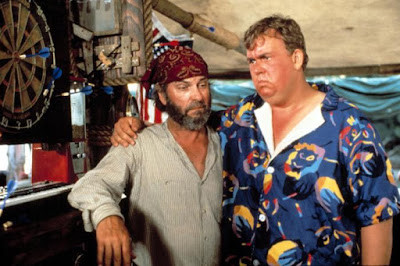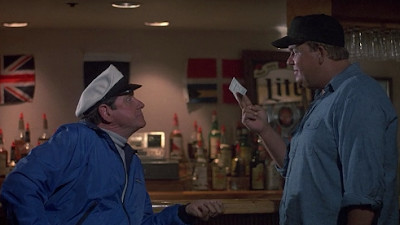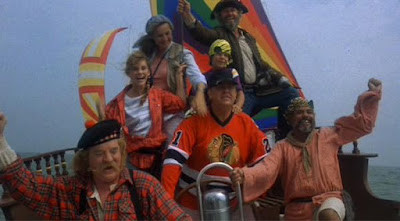“Do you know what it’s like to peak when you’re eighteen?” This poignant question, delivered by Rip Torn’s eccentric Scully to John Candy’s beleaguered Jack Chester in the 1985 comedy Summer Rental, marks a turning point in a film initially presented as lighthearted slapstick. What begins as a series of vacation mishaps evolves into a genuinely touching story of a middle-aged man rediscovering himself and reconnecting with his family. Summer Rental, starring the comedic genius John Candy, offers more than just laughs; it provides a surprisingly resonant look at burnout, family, and the unexpected joys of a summer getaway gone awry.
John Candy and Rip Torn share a scene in Summer Rental, highlighting the film’s shift from comedy to deeper themes.
From Slapstick to Heartfelt: The Transformation of Summer Rental
For many, the initial appeal of Summer Rental lies in its classic 80s comedy setup. We are introduced to Jack Chester, an air traffic controller clearly on the verge of a breakdown. His doctor orders him to take a vacation, and the Chester family packs up for Citrus Cove, Florida, in hopes of relaxation and reconnection. However, from the moment they hit the road, everything seems to go wrong. Eggs crack on the dashboard, wrong turns lead to comical confrontations, and Jack’s attempts to unwind are consistently thwarted by a series of unfortunate events. These early scenes, filled with physical comedy and relatable family vacation woes, are undeniably funny, echoing the slapstick humor of other 80s classics.
Yet, beneath the surface of these comedic mishaps, Summer Rental begins to explore something more profound. The humor isn’t just for laughs; it serves to highlight Jack’s deep-seated burnout and the desperate need for escape that many adults can relate to. As the film progresses, it cleverly shifts its focus, moving beyond mere slapstick to delve into themes of class, competition, and ultimately, family redemption.
Class Satire and Coastal Rivalries
Adding another layer to the narrative is the introduction of Al Pellet (Richard Crenna), Jack’s affluent and competitive foil. Pellet, with his captain’s hat, fancy yacht, and air of entitlement, represents the world of the wealthy vacationer, a stark contrast to the working-class Chester family. The film subtly uses this rivalry to explore class satire. When a mix-up forces the Chesters from a desirable beachfront property to a dilapidated “shanty” owned by Pellet himself, the class dynamic becomes even more pronounced. This relocation, and Pellet’s subsequent threats to evict the Chesters, leads to a moment of genuine heartbreak as Jack’s children witness his apparent failures.
The Chester family’s initial disappointment with their summer rental shanty, a scene from Summer Rental starring John Candy.
Redemption on the High Seas: The Regatta and Family Reconnection
The final act of Summer Rental sees Jack challenge Pellet to a local regatta. This isn’t just about winning a race; it’s about Jack reclaiming his self-respect and proving himself to his family. As the Chesters band together to prepare for the race, the film shifts into a higher gear, becoming genuinely cathartic. The family’s collective effort, the shared laughter, and the visible rekindling of their bond are far more emotionally resonant than typical vacation movie antics. While their victory in the regatta is predictable, the true triumph lies in Jack’s personal journey and the renewed connection with his loved ones. He finds peace not just at the finish line, but in the process of working alongside his family towards a common goal.
John Candy and his family participate in the regatta in Summer Rental, showcasing teamwork and family bonding.
An Ending at the Peak: Cherishing Fleeting Moments
Janet Maslin, in her original New York Times review, criticized Summer Rental‘s abrupt ending, stating it “doesn’t even have an ending; after the regatta is won, it simply stops.” However, this seemingly abrupt conclusion is actually one of the film’s strengths. Summer Rental wisely chooses to end at the high point, capturing the fleeting joy of vacation at its zenith. It avoids the inevitable post-vacation letdown, leaving the audience with the warm feeling of a family united and a man revitalized. Just like the best summer memories, the film concludes at that perfect, ephemeral moment we wish could last forever. Summer Rental, starring John Candy, reminds us that even amidst chaos and mishaps, the true value of a vacation lies in the moments of connection and rediscovery, however fleeting they may be.




